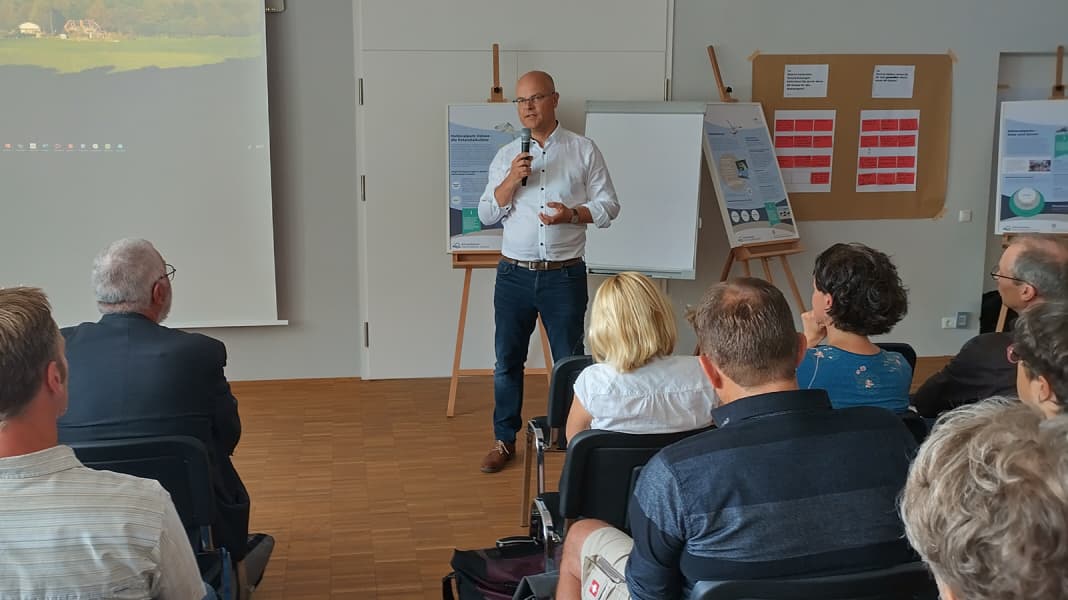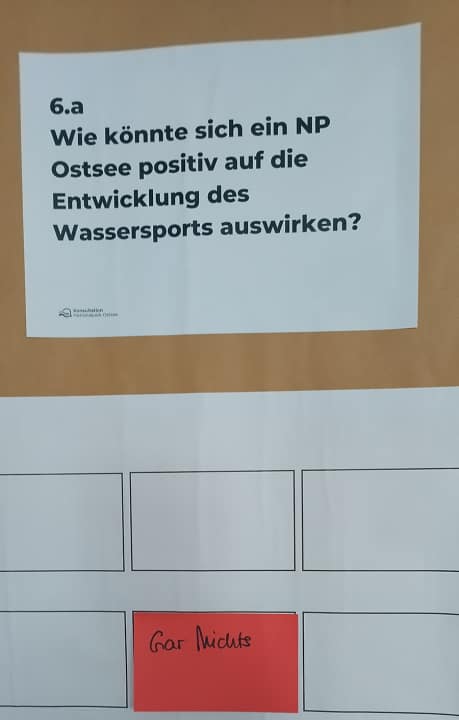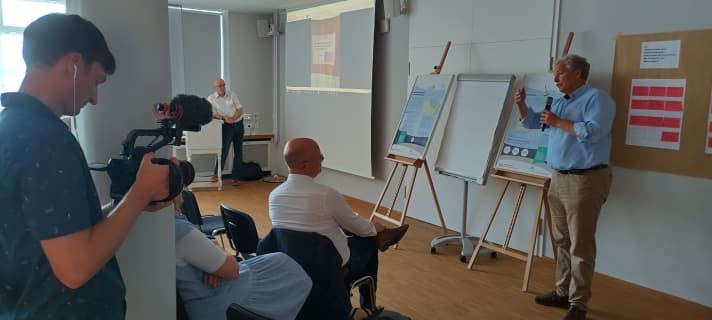
In a constructive atmosphere, the participants discussed issues relating to the planned Baltic Sea National Park. The ministry wanted to know what restrictions and risks are feared as a result of a national park, but also what would be required in order to practise water sports in its core zone. It was also asked what water sports are already doing to protect the environment and how these measures could be expanded. Finally, conceivable alternatives to area protection were also discussed.
After the closed meeting, which was held in several small groups, Minister Tobias Goldschmidt welcomed around 60 representatives from sailing, surfing and rowing clubs, sailing schools and water sports associations, the German Olympic Sports Confederation, the Schleswig-Holstein State Sports Association, the German Sailing Association and the Schleswig-Holstein State Sailing Association, trade associations such as the Federal Association of Water Sports and Water Tourism in Schleswig-Holstein and many more.
Baltic Sea National Park: common themes of water sports and nature conservation
The aim was to provide a representative cross-section of the relevant stakeholders with a connection to the Schleswig-Holstein Baltic Sea coast and to address topics that have not yet been addressed between water sports and nature conservation, said Goldschmidt in his welcome address to the participants.

It was not a routine appointment for the minister. The members of his staff had never had as much to say at any of the previous workshops on the national park as they did today at the water sports event. The fact that the majority of the invited clientele were in favour of the motto "More protection for the Baltic Sea Yes - National Park No" had become clear the day before when an open letter to him was published in the local press. In it, more than 60 representatives from business and politics expressed their concerns as to whether the ongoing consultations on the national park project were really about the "whether" or rather the "how".
In some districts of the country, more than 50 per cent of jobs are threatened by the project, which has an impact not only on water sports but also on tourism, fishing and sport fishing as well as agriculture.
The signatories therefore called for an open and transparent consultation process in which it should be explained why the desired goal can only be achieved through the planned national park, interventions where there is pressure to act, such as in the salvage of old munitions, stricter controls on illegal disposal by shipping, and stronger international agreements to protect the Baltic Sea, such as on inputs from agriculture.
Expert opinion: Question of legal admissibility
This morning, the Initiative Freie Ostsee Schleswig-Holstein also published a legal opinion on the "Admissibility and limits of the establishment of a Baltic Sea National Park", the authors of which came to the conclusion that the project would fail on several legal grounds.
Goldschmidt took it in his stride and emphasised once again in his welcome address that he was looking forward to an energetic discussion from which he wanted to take away suggestions from water sports on the "how" of water protection. After all, even if a national park law was not passed, these findings would help to take other measures to protect the Baltic Sea. The Minister called for trust and emphasised the common goal of wanting to better protect the Baltic Sea. He also addressed the expert opinion and emphasised that the principle of proportionality would be taken into account in a legislative process per se.
With regard to the public debate, Goldschmidt emphasised that, in addition to technical considerations, he also believes it is ethical to establish quiet zones in a heavily used sea where no fish should be taken out or wind turbines put in. Nevertheless, nothing has yet been decided politically and the debate on the "whether" has not yet taken place.
The full documentation of the workshop, including photos of all the responses from the groups, will be published on the state government's website in a few days' time.

The answers were presented by lawyer Hans Köster from Flensburg, who is responsible for environmental issues as an honorary board member of the Schleswig-Holstein Sailing Association. With the first question about the feared restrictions, Köster came straight to the most important topic for water sports. All conceivable restrictions would have an impact on water sports, the related economy and, last but not least, youth work. According to Köster, Schleswig-Holstein already has 30 years of experience with this, with regard to the national parks in the Wadden Sea. Sailing there suffers from access restrictions, dredging bans and the elimination of fairways.
With possible restrictions, emphasised Hauke Bernd, Chairman of the Kiel Yacht Club, Kiel is in question as a venue for Olympic sailing. This would be diametrically opposed to Schleswig-Holstein's political will to be a sporting state and would also mean a loss of cultural identity.
Voluntary agreements between politics and water sports
The Minister was impressed by the measures that have been taken in water sports for years to protect the environment. From thematisation in training to regular action days. Michael Stoldt, Department of Environment and Law of the German Sailing Association, pointed out to Goldschmidt the existing voluntary agreements between politics and sailing on regional quiet zones, which could be expanded.
When asked about the feared risks, Köster said that concerns had been expressed as to whether, once the national park had been established, further restrictions would be imposed in later years that no one was thinking about today.
In this context, the wish was expressed that the expected restrictions should be clearly stated. However, Goldschmidt explained that this would be difficult in view of the competing legislation of the state and the federal government, as the water area is a federal waterway. The state could apply to the federal government for regulations, but could not do anything about it if the federal government made its own.
In his thanks to the participants, the Minister emphasised once again that his aim was to reach out to each other and do something good for the Baltic Sea. He had heard the doubts about the national park project, as well as the willingness to do something for the Baltic Sea even without the umbrella of a national park.

